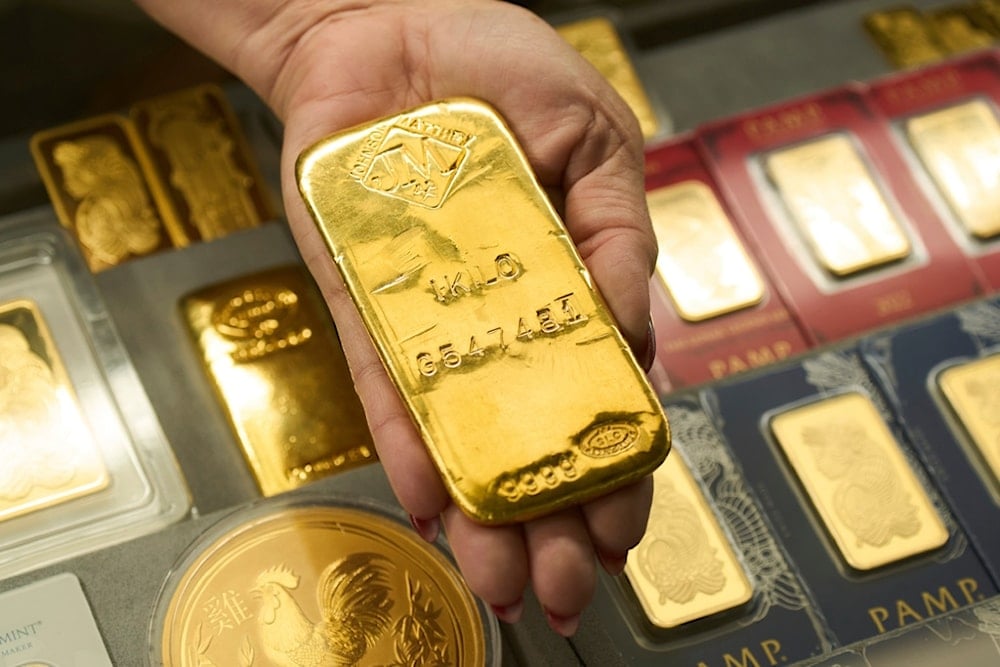Gold price tops $4,000 amid global turmoil, rate cut expectations
Gold surges past $4,000 an ounce for the first time as investors flee to safety amid the US government shutdown, among other factors.
-

Sam Nguyen shows a gold bar at her shop in the St. Vincent Jewelry Center in the Jewelry District of Los Angeles, Wednesday, April 30, 2025. (AP)
In a historic market move, gold prices surged past $4,000 an ounce for the first time on Wednesday, revealing intensifying investor unease amid a cascade of global economic and political risks.
The rally reflects a sweeping flight toward safe-haven assets as the United States grapples with a government shutdown, Europe faces renewed political upheaval, and investors begin to question the sustainability of the tech-driven market boom.
Instability premium
The partial shutdown of the US government, which began on October 1 after Congress failed to approve funding for the new fiscal year, has paralyzed key federal agencies and postponed critical economic data releases. The delay in employment and inflation reports has clouded the Federal Reserve's ability to make informed rate decisions, intensifying speculation that policymakers could soon pivot toward rate cuts to cushion the economy.
Political turbulence in Europe has further fueled investor anxiety. In France, Prime Minister Sébastien Lecornu resigned earlier this week, and former premier Édouard Philippe publicly urged President Emmanuel Macron to step down and call early elections, a move that rattled confidence in the eurozone's second-largest economy. The political vacuum in Paris has become another source of instability for markets already on edge.
Bubble fear
Meanwhile, growing concerns about a potential asset bubble in technology stocks are prompting investors to rebalance portfolios. The artificial intelligence boom has propelled chipmaker Nvidia to a staggering $4 trillion valuation, but disappointing profit margins at Oracle's cloud division have cast doubt on whether AI-driven gains can be sustained.
"In a market priced for perfection, any delay in cash flow — even a temporary one — feels like the bartender calling ‘last call,'" said Stephen Innes of SPI Asset Management. "Traders didn't wait for clarification; they simply started easing out of their positions. The Oracle story didn't crash the party, but it definitely sobered it."
Read more: AI boom sends China’s hardware stocks soaring
Gold climbed to an intraday high of $4,006.68, defying a stronger US dollar, a sign of how broad the shift into safe assets has become. Silver also neared its all-time high. Analysts attribute the surge to a mix of central bank demand, massive inflows into gold-backed exchange-traded funds (ETFs), and growing fears of monetary and political disorder.
"The rapid rise in gold prices has been supported by rising inflows into (exchange-traded funds) and central bank buying, including solid demand from China, as gold benefits from political, economic, and inflation uncertainty," wrote Taylor Nugent of National Australia Bank.
Flight to bullion
Global central banks, particularly in China, Russia, and emerging markets, have been steadily accumulating gold as part of a broader diversification away from the US dollar, a trend that has accelerated since Washington's debt ceiling standoffs and repeated shutdown crises. Analysts describe this as a "de-dollarization hedge", reflecting waning confidence in US fiscal stability.
Asian equities reacted nervously to the developments. Tech-heavy markets in Hong Kong and Taipei posted sharp losses, while Sydney and Singapore also declined. Tokyo edged higher, buoyed by expectations that newly elected conservative leader Sanae Takaichi will implement fresh stimulus and monetary easing measures. Wellington, Manila, and Jakarta recorded modest gains.
Some analysts warn that momentum-driven "gold-plated FOMO", fear of missing out, is now propelling the rally beyond fundamental levels. But for many investors, the move into bullion reflects a deeper shift: from speculative optimism to crisis hedging.
With the US government partially shut down, Europe politically fragmented, and markets questioning the limits of the AI boom, gold's record-breaking ascent signals more than a technical milestone. It marks a collective retreat from uncertainty into the perceived safety of hard assets.

 4 Min Read
4 Min Read








